David Turnley
Pulitzer Prize winning photojournalist and filmmaker
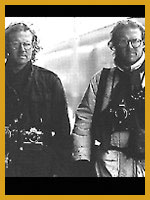
David Turnley (left) with his
twin brother, photographer
Peter Turnley
David Turnley is considered by many to be one of the best documentary photographers working today. He won the 1990 Pulitzer Prize for Photography, and has been a Pulitzer Prize finalist four times. In 1988 and 1991 he won the World Press Picture of the Year.
Turnley was a Detroit Free Press staff photographer from 1980 to 1998. He was based in South Africa from 1985 to 1987, where he documented the country under Apartheid rule. He was based in Paris from 1987 to 1997, covering such events as the Persian Gulf War, revolutions in Eastern Europe, student uprisings in China and the disintegration of the Soviet Union.
Turnley earned a B.A. in French Literature from the University of Michigan, received an Honorary Doctoral degree from the New School of Social Research in 1997, and has also studied at the Sorbonne in Paris. He studied under a Nieman Foundation Fellowship at Harvard in 1997-1998.
In 1998 David began working in video as well as still photography. He incorporated the two in a documentary The Dalai Lama: At Home in Exile (CNN), which was nominated for an Emmy. He has since had four pieces featuring a similar topic shown on ABC's Nightline. In 1999, he produced, directed, and photographed his first feature-length documentary, La Tropical, a sensual portrait of a wildly popular dance hall in Havana which has been central to the lives of working-class Cubans of color for more than half a century. La Tropical recently won Best Documentary in the Miami International Film Festival, and the film is currently being seen in festivals around the world.
David is the author of Baghdad Blues: A War Diary and the co-author of David & Peter Turnley: In Times of War and Peace.
Today he lives and works from New York City.
To be with David Turnley is to be in the presence of your own magnificence. It is my pleasure to know him. Enjoy what he has to share about himself and about his views.
DR: David, tell me anything that you want to about you, your life, your work…
DT: I was out in Indiana on Tuesday. I was receiving an award - The Indiana Governor's Award - so, when I received this, I had to say a few words in front of the Indiana Audience and of course it kind of took me back to my being raised in Indiana. And, I was trying to think about what things about my life, in relationship to anything that I may have accomplished, and what the inspiration might have been, in terms of arts and my work as a photo journalist…and yesterday I was walking down the street and I was realizing the extent to which the words "We are all created equal" had been such a part of my youth. That Dr. King's words really were in my family and in my era…I am 50…but you know, certainly specific to my family during that era…I was raised at the dinner table and that was really an important topic on life and yet, the reality certainly, in my hometown, did not play out that way. I mean, it was essentially a segregated town.
As an athlete - I was a pretty good football player. My teams, only starting in high school, were integrated. The schools previous to that, were segregated. And so, suddenly in high school, half of my team, at the end of a practice, would have to get on a bus and go back to the inner-city. Or, at the end of a game, after we had just come together in this solidarity, and felt that solidarity, and then suddenly you know, at the end of the whole thing, after we had put our clothes on in the locker room, they'd get on a bus or get in cars to go back to another part of town. And I knew that part of town because my parents, I am proud to say, were always very outspoken and active in their way, with civil rights in our city. So the words "We are all created equal", as much as they came to be for me, the essence of how I interact with the world, there was also a deep sense of injustice that I was witnessing.
I was thinking that the word dignity was sort of the…I had to, at some point process, "How are we created equal?" and "What is equal?", 'cause clearly things weren't equal. So what is it that we have that is equal? And I came to understand, pretty young, that what we all have available to us is -
Dignity.
When I fell into photography, it was then…the idea -- which came as a total surprise to me - the idea that I could use a camera to essentially pursue that mission which was to reveal this idea that everyone has innately some inherent dignity. So that's been kind of my mission. Whether it was in the beginning of my photographic journey in Fort Wayne, Indiana, or as I have gone out into the world, it's really been my own need to confirm this idea somehow.
DR: That everyone has dignity?
DT: Yeah. That the idea that "We are all created equal" somehow is a truth and how I could find that was to somehow seek…well, it's just always been about trying to seek that -- confirmation of that.
So, now I am fifty years old and I have certainly traveled all over the world. I have worked in about 75 countries and covered…I didn't set out to be a war photographer but…one could legitimately call me that, although I have tried to redirect my life quite a bit.
DR: What do you mean?
DT: I have, probably as much as anybody, witnessed the manifestation of conflict in our world, but I have to say, I think of myself as a very optimistic person. I think about that and what's that about and how do I maintain that, given what I have seen. The truth is that along the way, I have probably witnessed more acts of graciousness and generosity than anything else and that is what has imbued me with such a deep affirmation of our potential…that, I just can't let go of. If I lose that, I'm gone.
And I would have to say…I was lucky. I had parents who were madly in love for about 52 years and that also imbued me with a real sense of hopefulness about the ability for people to find respect in each other. But that is a long story though…
DR: You are very passionate. What are you most passionate about?
DT: Love.
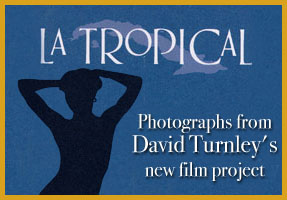
Documenting the Rhythms of Cuba
By David Turnley
In 1997, working as a photographer for Life magazine, I went to Cuba with Muhammad Ali. We had the opportunity to connect very quickly with the heart and soul of the Cuban people for whom Muhammad Ali is a hero. I was enchanted by the sensuality, the pathos, the exuberance, the tension, and the incredible visual quality of Cuba.
Three years later, after a Nieman Fellowship studying documentary filmmaking, I was given support and funding from Corbis, a digital image company, to shoot and direct a feature-length documentary. We wanted to choose a theme that would be compelling to a mass audience and to use small digital cameras to achieve a look and an intimacy that I have tried to find in my photographic work.
As my thoughts turned back to Cuba, I imagined that there must be a kind of "speakeasy" in every quarter of Havana where Cubans go to dance. But during a research trip, we found out quickly that there is really only one place where working-class Cubans have always gone to dance - a club known as La Tropical on the edge of Havana, the "Apollo Theatre" of Cuba. I immediately fell in love with the place - a funky, run down, open-air amphitheater that turns into a gyrating pool of passion as the sun goes down. La Tropical would serve as our central character and the window we would use to reach into the everyday lives of a cast of contemporary Cubans. It also became clear that the history of La Tropical would offer a look at the legacy and importance of race in Cuba.
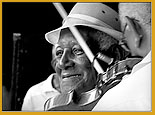
With two-month visas, we went to Havana in the summer of 2000 with a crew that included a producer and a world-class sound engineer. There, we worked with a driver and a brilliant young Colombian woman, Arianna Orejuela, who has been in Cuba for the past 10 years and who is currently writing what will certainly be among the notable references of contemporary Cuban music.
Every evening during June and July we filmed the daily concerts and cabarets at La Tropical. I worked as the principal cameraman, usually with a second camera. For a couple of important concerts, we worked with as many as six other cameramen. During the first week, we cast six to eight characters, whose lives I then tried to immerse myself in from morning until night during the next eight weeks. This work I did by myself, working both the camera and sound and speaking Spanish without a translator. I found out very quickly that this was the only way that a kind of confidence, conversation and serendipity would happen that would provide the opportunity to witness this variety of characters "living" their lives in front of the camera.
We shot 300 hours of footage using, principally, a small Sony DV camera. We also collected some 100 hours of interviews from musicologists, sociologists, historians and ethnographers, and recorded hundreds of music tracks at La Tropical using a DAT recorder.
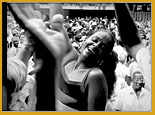
Before going to Cuba I made the decision to shoot the film on video in black and white. My rationale had to do with wanting to create a powerful visual aesthetic, to capture the timeless quality one feels there - it is as if nothing has changed since the revolution in 1959 - and to capture the passion and grittiness of contemporary Cuba.
I interviewed a number of talented editors before selecting Chris Horn, who worked with me for a year to edit the film. Chris came from a commercial background and his work had a feel I loved. I found him to be temperamentally and sociopolitically someone whom I respected enormously. We built a structure together, then tried to establish a process that let the edit have its own organic quality. It is as if Chris co-directed the film, and I feel very fortunate because of our collaboration. The difficulty of trying to weave together an enormous quantity of music while using a foreign language and a voiceover with no narrator made the edit a challenge, and a large number of people participated in the process.
I will always feel that I am a photographer who has taken on the challenge of the extra layers of storytelling enabled by moving-image narrative filmmaking. "La Tropical" is now making the circuit of dozens of film festivals, and it just won the Golden Light Award for Best Documentary in the Miami Film Festival. We are seeking a theatrical and television distributor.
I am back at work as a freelance photographer and filmmaker and would like to continue pursuing different forms of narrative storytelling, including photographic book projects, exhibits and filmmaking.
Click here to view a clip of David Turnley's La Tropical. (Clip #1)
DR: I can really get that about you. How does that inform your life; play out in your life?
DT: Well currently, I am involved with someone that is informing it quite deeply. I have found somebody recently that I am feeling a profound sense of respect for and just also someone who I am totally enamored with. And I do think that, yes, in sort of a lifetime pursuit to find that, having witnessed….
…what defines that for me is respect. We can put all of the flowery stuff into it, and attraction and all that, but I do think for me what defines ultimately the potential for real connection is --
Respect.
DR: And what do you respect?
DT: I respect people for who they are; people who are true to themselves, to their passions, to their convictions. I happen to believe in creativity as a value, as a virtue. I am always attracted to people who have found in themselves, the confidence to express themselves in whatever way that is.
DR: Yes. That is attractive. It really does make life interesting. Let me ask you - what are you interested in? What are you curious about?
DT: Hmmm. Well, I am always curious about people's life experiences and how they have come to be who they are. And, I suppose I am most often curious about people who I feel at some level, have experienced some adversity in their lives and I am curious about how they have coped with that.
DR: Yep, Me too. And why is that for you? Why are you curious about that, in particular?
DT: Well I think it's probably having realized pretty early that you could say against the backdrop of this concept that "We are all created equal" that life, as it manifests, is not necessarily always fair. So then the question is, "How do people deal with that?" And I have certainly witnessed people who have dealt with that in the most unbelievably self determined ways and not to mention, so often in such gracious ways. I am very intrigued by the concept of grace and where that comes from.
DR: And grace for you…Can you describe what that is, what grace is for you?
DT: I think it can be a lot of things, Dana. I mean certainly I am very visual in my sensibilities. I see grace in an aesthetic way; as simply as how someone puts themselves together. But I think more profoundly for me, it's more about how someone reveals their soul.
DR: Yes. It's so interesting that you are mentioning things that I have been contemplating a lot lately. For instance I have, lately been extremely curious about people and who they become as a result of their adversity and how they take adversity and use it to move forward in their lives.
DT: Absolutely.
DR: And, I don't know, I have found that some of the most beautiful people have had to struggle through something to get to where they are and they are some of the most interesting people too…
DT: I totally agree with you…
DR: …but enough about me (laughing) and what I think….
DT: …(laughing) I think we share a lot in common…
DR: ...tell me, tell me, tell me about a time in your life when you had to deal with adversity and then turned it around somehow.
DT: Well, I think the first time, professionally, I felt a coming together of what I might have, in terms of my own human assets; my trying to make a contribution in a constructive way, was in South Africa in the mid '80's.
I had gone there at a time when apartheid was certainly a household concept in this country in terms of a kind of general pervasive sense of that injustice…but also...I didn't feel so different in my own hometown. You know there was a kind of apartheid in Fort Wayne, Indiana, that I felt very profoundly. So, when I got to South Africa, in 1985, as much as the word and the legislative system of racial segregation had been perfected in South Africa, it wasn't unfamiliar to me. It felt very familiar. So I was able to go at that from a perspective of, I think, empathy. And that, pretty quickly, I understood to be, the most profound approach to the issue. That what I could accomplish was more profound in trying to reveal the humanity of South Africans and how they interact, as opposed to necessarily trying to pound with a hammer, the idea that there was one group that was good or bad or… you know…I really kind of wanted to, well it wasn't that I wanted to, it was that I felt a palette of humanity, not a palette of color. I felt that everybody had been victimized by this system. And, quite honestly, I felt that growing up in this country. I continue to feel it.
DR: So everybody on both sides of the condition…
DT: Whatever gets in the way of people connecting as human beings, just always seems to me to be a major tragedy.
DR: It's like we have all inherited that condition to some degree.
DT: Absolutely. During those three years that I worked there, and I worked very intensively, I felt like I was able to do my work. It got published all over the world. I was able to make a fairly valuable contribution so, I was very proud of that. And what I found was that I had the ability…that what I bring to my work is that I lose consciousness of my exterior when I am with people so that I am able to very quickly integrate in any group of people. That can be very disarming and it earns me access into people's lives.
DR: Kind of like the quiet observer?
DT: Well I think it's that if you look into someone's eyes and you are open, people feel that. So the rest kind of gets lost very quickly. You sort of find a very disarming connection that defies the exterior.
DR: And you know, that is exactly how I experience you.
DT: Well, likewise.
DR: I can speak first hand about your ability to do that. How would you define then, your overall contribution to the world?
DT: I question that quite often, to be quite honest. I don't feel at all smug about my contribution. In fact, if anything, I am very hard on myself. I would like to think that the work that I have done as a photographer, touches people at a very soulful place and very quickly people get moved beyond the exoticism of diversity; witnessing human life in a way that they can touch. Then I'd like to think that I look at the world with eyes and with a heart that is not only hopeful, but fun at some level. For me that is my driving force.
DR: Really?
DT: Yes. I like to dance for instance.
DR: What kind of dance?
DT: Anything. I just love to move to music.
DR: Yes?
DT: That is available to all of us…it doesn't take a lot to get me excited. I mean I can have fun doing very simple little things - including sitting here looking into your beautiful eyes….
(I laugh because I am now -- really disarmed and so I ask the first question that comes to mind before my blushing becomes obvious)
DR: Um, so if I were to ask you what scares you and how do you overcome that, what would you say?
DT: That is a creative question. I confront pretty quickly and readily, fears that other people may not. I can make pretty cautious and calculated decisions about risk when it comes to going to war zones and how I might deal with that. I kind of figure out what is manageable and what isn't and what I think I can….I think probably my biggest fear is my insecurities -- not danger.
DR: And isn't that such a human quality?
DT: Yeah. Like sometimes I am in the city of New York and I think to myself
"If I can eradicate my insecurities, the palette of interesting humanity is infinite. It's just there."
So the only thing getting in the way of my intersecting with that is me.
DR: So just share with me one of your insecurities.
DT: My own prejudice. Allowing my own prejudices -- that I have been formed with -- to interfere with my giving someone a fair chance, and giving them a fair chance about me...it is precisely what I am advocating, that I remove the reflexes that might get in the way of what otherwise could be an interesting connection. Whether it's because of my own…
It's interesting. I grew up in a liberal family with a very acute sense of the disenfranchised. I can't honestly say that there is any reason why I should have ever felt disenfranchised. But for some reason I deeply identify with the disenfranchised. One of the challenges that I have sometimes is, that if I encounter someone who projects whatever the opposite of that is - privilege - I have to work at not allowing that perception to get in the way of my simply giving that encounter a fair chance…
DR: So when that comes up, how do you overcome that?
DT: I have to work at it. I really do. The way I overcome it is to realize that I would be the victim of that because it would only serve to create a very narrow range of human beings that I would interact with. And, at some level, that's a very sad way to live. You just limit yourself…
DR: I don't know, I think that you get to a certain point in life…I get really horrified when I think about what I have potentially missed out on in life because I made up my mind about someone or something too soon…
DT: That's right.
DR: ...and as I am expanding my capacity to accept things or be more curious, the things that I am finding out about people and things are so fascinating. And I think "Oh my gosh! What have I been doing!"
DT: Right.
DR: I think that when we can notice ourselves getting in our own way, it opens a door.
Tell me what makes you happy.
DT: Well children make me happy. My son makes me very happy. All of the qualities of youthfulness, an openness to life… I love dance and rhythm. It could be music but it could also be anything that I …anecdotes to people's lives. It can be what I witness with my eyes….
Honest people make me happy - always. People who are just who they are, unabashedly, that makes me happy….Sharing in other people's life experiences, even when those experiences aren't happy, that makes me happy…A sense of connection of my life to other people's lives…I think the thing that probably makes me unhappy is isolation or a sense of isolation, although I can enjoy being alone. The woman that I am with right now makes me happy in a way that I have never experienced. It's a kind of pure joy. In the morning when I see her smile, that makes me happy.
DR: The fact that what you are passionate about is love, the fact that, what makes you happy is people and the woman that you love - well that is so consistent with who you are; so simple and so beautiful.
The last question that I want to ask you is -
A hundred years from now, what do you want to be remembered for?
DT: Having been a good father, and having had the capacity to make someone's life happy.
DR: Anything else?
DT: Nope. That more than anything else...
Thanks David!
From the New York Times:
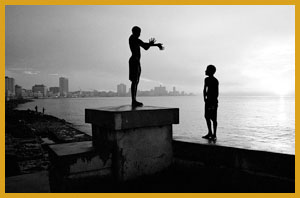
La Tropical, David Turnley's sinuous black-and-white documentary about an open-air dance club on the outskirts of Havana, places passion and rhythm before politics and history. Yet Mr. Turnley, a Pulitzer Prize-winning photojournalist, uses his stunning monochromatic images to build sociological context for a place where working-class Cubans come to dance, drink and hook up.
Originally a brewery, the club took off in the 1940's with a black clientele excluded from Cuba's white dance halls. Poking at the island's enduring racism — light-skinned men are still the gold standard as far as fathering children is concerned — Mr. Turnley elicits frank opinions from both light-skinned and black interviewees, while acknowledging that the blacks gained most from Castro's revolution.
But the jagged politics of race and class are secondary to the film's irresistible soundtrack and effervescent images: watching a 77-year-old woman dance joyously in the middle of a downpour, or ecstatic musicians writhe in costumes of satin and lamé, it's difficult to recall the daily deprivations of most islanders' lives.
Crammed with comments from patrons and performers, "La Tropical" is a sensual celebration of people for whom dancing is the "most important nonreligious ritual." Lodged in a mass of sweating, spandex-clad bodies, Mr. Turnley's camera peeks up skirts and gazes, enthralled, at quivering female rumps. Cubans, we are told, are always in motion; watching this film, you can believe it.
La Tropical
Produced and directed by David Turnley; in Spanish and English, with English subtitles; director of photography, Mr. Turnley; edited by Chris Horn; released by Fabrication Films. At the Village East, Second Avenue at 12th Street, East Village. Running time: 93 minutes. This film is not rated.
Click here to watch a video clip from David Turnley's La Tropical. (Clip #2)
